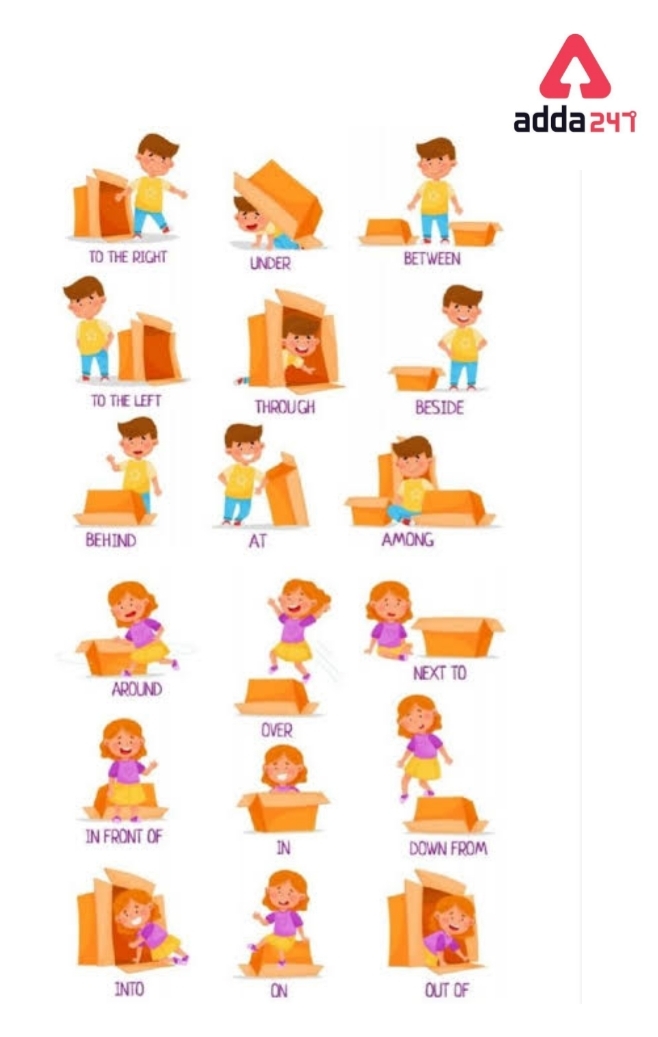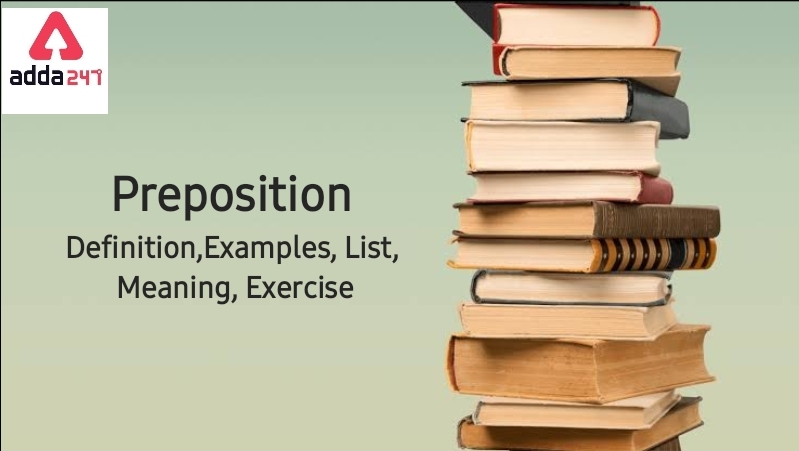Preposition
In English grammar, a preposition is a type of part of speech that establishes the relationship between the noun or pronoun and other words in the sentence. “The book is the table.” Is this sentence correct? Is this sentence complete? Does this sentence mean what it means? No. If we add the preposition ‘on’, then the sentence is complete and means correctly—’ The book is on the table ‘. So, preposition plays a vital role in sentence formation. Let’s discuss preposition definitions, types, and examples. In this article, a list of exercises based on prepositions is provided for practice.
Preposition Definition
A preposition is a group of words or words that come before or after a noun or a pronoun to show the relationship between the noun or pronoun and the other words in the sentence. In English grammar, we can’t use a preposition at the end of a sentence. For example,
1. I go to school every day.
2. Mohon lives in Modinagar in Uttar Pradesh.
In the above sentences, “to,” “at,” and “in” are the prepositions. Some more examples of prepositions are: to, from, over, under, among, between, across, through, etc.
Meaning of Preposition
A preposition is a word that shows the relationship between a noun or pronoun and other words in a sentence. It indicates location, direction, time, manner, or other relationships between different elements within a sentence. Prepositions are essential in providing context and clarifying the relationships between various objects, people, or ideas. Here are a few examples of common prepositions:
- In: The book is in the bag. (Shows the location of the book relative to the bag.)
- On: The cat is sitting on the table. (Indicates the surface on which the cat is located.)
- At: I will meet you at the park. (Specifies the place where the meeting will happen.)
- By: The painting was done by an artist. (Identifies the creator of the painting.)
- With: I went to the party with my friends. (Describes the companionship or association between the speaker and their friends.)
- To: She gave a gift to her sister. (Shows the recipient of the gift.)
- From: I received a letter from my cousin. (Indicates the source or origin of the letter.)
- For: I bought flowers for my mom. (Specifies the purpose or intended recipient of the flowers.)
- About: They were talking about the movie. (Indicates the topic or subject of the conversation.)
- Through: We walked through the park. (Denotes movement or passage within the park.)
These examples demonstrate how prepositions establish connections between different parts of a sentence, clarifying relationships such as location, direction, time, and more.
Preposition Through Pictures

Prepositions List
Here is a list of some common prepositions which we are used in our daily conversion.
| In | Beyond | Before | Towards |
| On | Than | After | Into |
| Beside | To | Above | Onto |
| Through | within | Over | Beneath |
| Across | Under | At | In front of |
| Against | Around | with | Up |
| Among | Between | From | Down |
| With | By | Along | Out |
| Near | About | Until | Away |
| Up | Below | Next to | On to |
Preposition Types
Preposition is a little confusing to students. Because the meaning and usage of prepositions are different in different contexts, Now we have to understand the usage of prepositions in different aspects. According to the usage and meaning of prepositions, we can classify prepositions into several categories:
Preposition of place or location
The preposition of place is used to describe the place or position of something. example-in, on, upon, under, over, behind, etc.
1. Sheela was standing behind me in the queue.
2. Mohon lives in a village.
Preposition of direction
The preposition of direction describes the movement of something. For instance: into, towards, from, onto, and so on.
- A bucket fell into the well.
- She came into the library and started looking for a book.
- I will return from school at 4 pm.
- The baby ran towards his mother when he saw her.
Preposition of time
The proposition of time helps to describe the time or when something is happening. For example, from, at, on, in, between, etc.
1. I will complete the work after lunch.
2. Call me between 10 a.m. and 12 p.m.
3. The result will be published on August 5th.
Prepositional Phrase
Prepositional phrases are formed by combining both nouns and prepositions. For example, out of the limit, at once, on time, etc.
Preposition Examples
There are some prepositions that are confusing due to their different meanings and usage in different contexts. Let’s understand some of these prepositions in detail.
- in and within
In indicates a time in the future, such as within a short time.
Example-
(a)Azad will return in two days.
(b) Radhika and her mother will return within a week.
- between and among
Between is used for two people or things, while among is used for more than two people or things.
Example-
(a)Those two women quarreled among themselves.
(b) There is no difference between Bittu and his cousin.
- Beside and Besides
Beside is described as by the side of, while besides stands for in addition to.
Example-
(a)She came and sat beside me.
(b) Besides being fined, she was sentenced to a term of imprisonment.
- in and into
The position of something at rest is denoted by in, whereas something in motion is denoted by into.
Example-
(a)Milan is in the library.
(b) She came into the library and started looking for a book.
- Since and Before
Since is used to describe time. But before is used for both time and place.
Example=
(a) Vikas hasn’t played with us since last week.
(b) They watched a movie from 6 pm to 8 pm.
6. In/at/on
The preposition ‘in’ is used before morning, morning, month, etc., whereas we use it at night, A.M., P.M., dawn
, dusk, etc. We use ‘on’ before the name of any day, any specific date, etc.
Example-
(a) She will come to meet me in the evening.
b) I used to wake up in the morning at 6 o’clock.
Preposition Excercise
Fill in the blanks with appropriate prepositions.
- The protesters assembled and marched ________ the railway station.
- The government acted judiciously to stave ___________the crisis.
- She is better ________ and senior ________ him.
- There are trade agreements _________ all the developed nations.
- In accordance with the advice of a doctor she is ____________ diet.
- The Earth moves___________ the Sun.
- Children by the force of habit are attracted ___________ anything that glitters
- I could not cope ________ the excessive heat.
- The Newspaper will issue a supplement _________ the issue ____ August 15.
- The matter is ________ the jurisdiction of the court.
- There is no need ___________ help a reckless fellow like him
- Don’t lean ________ the wall.
- The protesters assembled and marched ________ the railway station.
- . The bus is heading ________ the city.
- He is a cosmopolitan and tolerant ______ the religious views of others.
Related Post:
- Abstract Noun Examples And Definition
- Verb Forms- Three (3) Forms Of Verb, V1, V2, V3
- Independence Day Of India 2022
- Collective Nouns Examples List
Preposition: QNAs
Q. What do you mean by a preposition?
A preposition is a group of words or words that come before or after a noun or a pronoun to show the relationship between the noun or pronoun and the other words in the sentence. For example,
Mohon lives in Modinagar in Uttar Pradesh. In the sentence, ” “at,” and “in” are prepositions. Some more examples of prepositions are: to, from, over, under, among, between, across, through, etc.
Q. Why preposition is important in a sentence?
Preposition plays a vital role in sentence formation. A preposition is a type of part of speech that establishes the relationship between the noun or pronoun and other words or objects in the sentence.
Q.What are the three types of Prepositions?
The three types of prepositions are- Preposition of time ( Eg- During, until, at, on ), Preposition of direction 9Eg- towards, from, to ), Preposition of place or location ( Eg- in, on, upon, under, over, behind, etc.)
Q. How does the preposition ‘in’ differ from ‘into’?
There is a slide difference between them. The position of something at rest is denoted by in, whereas something in motion is denoted by into. Example- (a)Milan is in the library. (b) She came into the library and started looking for a book.
Q. How does the preposition ‘between’ differ from ‘among’?
Between is used for two people or things, while among is used for more than two people or things. Example-(a)Those two women quarreled among themselves. ,(b) There is no difference between Bittu and his cousin.









 CBSE Admit Card 2026 for Private & R...
CBSE Admit Card 2026 for Private & R...
 AILET 2026 AIR 1: Check Full Toppers Lis...
AILET 2026 AIR 1: Check Full Toppers Lis...
 AILET Result 2026 OUT, How to Download S...
AILET Result 2026 OUT, How to Download S...














